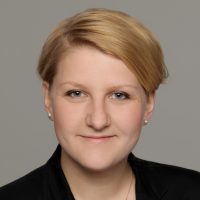Civil Society in a Time of Uncertainty: Lessons Learned from Wider Europe

Liana Fix
Council on Foreign Relations
Liana Fix is a fellow for Europe at the Council on Foreign Relations (CFR). She is a historian and political scientist, with expertise in German and European foreign and security policy, European security, transatlantic relations, Russia, and Eastern Europe. She is also the author of A New German Power? Germany’s Role in European Russia Policy (Palgrave Macmillan, 2021). Dr. Fix’s work focuses on German domestic and foreign policy, the European Union, transatlantic relations, and Europe’s relations with Russia and China.
Prior to joining CFR, Dr. Fix was program director for international affairs at Körber-Stiftung in Berlin. She was also a resident fellow at the German Marshall Fund in Washington, DC, and a DAAD/AICGS fellow at the American Institute for Contemporary German Studies. From 2018 to 2019, she was a fellow for global governance futures at the Robert Bosch Foundation Multilateral Dialogues. From 2014 to 2016, Dr. Fix was a doctoral fellow at the German Institute for International and Security Affairs and associate fellow at the German Council on Foreign Relations. From 2012 to 2013, Dr. Fix worked as a Mercator fellow for international affairs at the German Federal Foreign Office, the EU Delegation in Tbilisi, and the Carnegie Moscow Center.
Dr. Fix has contributed essays, policy papers, and articles to peer-reviewed journals including Foreign Affairs, Foreign Policy, and the Washington Quarterly, among others. She is also a frequent contributor to international and German-language media.
Dr. Fix received her MSc in theory and history of international relations from the London School of Economics and Political Science and her PhD in political science from the Justus Liebig University Giessen. She is a member of the European Leadership Network Younger Generation Leaders Network on Euro-Atlantic Security and of Women in International Security.
The transatlantic relationship is undergoing a fundamental shift in that the idea of the West as a community of values and interests is in question—not only since the election of the new U.S. president and Brexit, but also since populist forces have gained ground on the European continent. The last year has revealed a fundamental sense of uncertainty in the West.
While some years ago, Russia was singled out as the main force undermining the unity of the West, it seems now that it is the West itself that is putting into question its institutions and structures, or as Anne Applebaum tweeted: “The biggest threat to the West is the U.S. President.”
Against this backdrop, what role can civil society play to counter disintegration forces in the West, and what can U.S. civil society, struggling with how to deal with the new president, learn from their counterparts across the Atlantic? It is time to transcend barriers and to draw lessons learned from the wider space of civil society in the U.S., Wider Europe, and Russia, which can fruitfully stimulate each other. While the challenges may be different, what they have in common is certainly an “illiberal moment” in our politics and the need to find an answer to the question of how media and civil society can deal with illiberal tendencies. Some Russian journalists have already shared their lessons learned.
The following further recommendations emerge from this agenda:
- Civil Rights: Establish and intensify contacts between U.S., European, and Russian civil rights organizations. For instance, a better cooperation between the ACLU and European organizations could have helped to clarify the status of dual-citizenship holders during the travel ban.
- Media: Convene conferences and establish platforms for U.S., European, and Russian media representatives to exchange lessons learned, as has already been attempted by another Russian journalist: How to cover a hostile president?
- Business: U.S. and European business associations should speak out against protectionist tendencies, which will ultimately hurt everyone involved, instead of racing for the goodwill of their administration. More transparency, in particular in U.S.-Russian business relations structures, is urgently needed.
- Education: Exchange lessons learned, for instance from Germany, on civil education and “political education” (“Politische Bildung”). Establish a similar institution to the Bundeszentrale für politische Bildung (Federal Agency for Civic Education) in the U.S., Russia, and other countries, making sure that they are independent of government funding. Reflect on the instrumentalization of history and historical stereotypes in current politics.
Through such cooperation efforts, civil society can play an important role in countering the “illiberal moment” in our politics and strengthening transatlantic relations in times of political volatility—when the need to rely on civil society is greater than ever.







